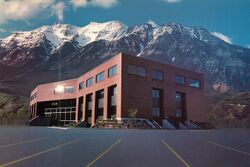Company:Wicat Systems
 Headquarters in Orem, Utah | |
| Type | Private |
|---|---|
| Industry | Computer |
| Fate | Acquired by Jostens |
| Founded | 1980 |
| Founder | Dustin H. Heuston |
| Defunct | April 1992 |
| Headquarters | United States |
| Products |
|
Wicat Systems, Inc., was an American computer and software company founded in 1980 in Orem, Utah. Originally a branch of WICAT, the World Institute for Computer-Assisted Teaching (later the Wicat Education Institute), the company manufactured multi-user systems for educational institutions before focusing their efforts on educational software development in the early 1990s.[1] The company was among the first to use the Motorola 68000 microprocessor in a computer with the introduction of the Wicat System 100 in 1980.({{{1}}}, {{{2}}}) Both Wicat Systems and its parent institution were founded by Dustin H. Heuston, originally of New York.[1]
History
At its peak in the mid-1980s, Wicat Systems employed 500 and had an annual budget of US$40 million.[2] The company formed a joint venture with Control Data Corporation in early 1985. Named Plato/Wicat after Control Data's Plato educational software, the venture was intended to "address the entire educational process, including computer-based instructional courseware, testing and evaluation, and classroom management and administration".[3]
In 1992, the company was acquired by Jostens in a stock swap valuated at roughly $111 million. Jostens, who had a rival educational software division Jostens Learning which was aimed at preschools, planned to use the Wicat Systems repertoire to increase their presence in high schools and higher education.[4]
During the period from the late 1980's to 1996, WICAT systems also operated a UK branch in Camberley in Surrey. During this period WICAT produced CBT (computer based training - the forerunner of eLearning), and partial cockpit simulations for aviation clients. These included many of the then leading airlines and aircraft manufacturers and training covered pilot, cabin crew and ground crew training. Norfolk Southern American Railroad company was another of many non aviation clients.
Citations
- ↑ 1.0 1.1 Rogerson 1990.
- ↑ Fiske 1986, p. C1.
- ↑ Staff writer 1985.
- ↑ Staff writer 1992a.
References
- Fiske, Edward B. (April 15, 1986). "Computer Innovation in Class". The New York Times: p. C1. Archived from the original on January 29, 2021. https://web.archive.org/web/20210129191049/https://www.nytimes.com/1986/04/15/science/education-computer-innovation-in-class.html.
- Hogan, Thom (June 8, 1981). "68000 Systems Arrive". InfoWorld 3 (11): 3. https://books.google.com/books?id=zD0EAAAAMBAJ&pg=PA3.
- Rogerson, Kenneth S. (October 31, 1990). "Wicat Systems Celebrates 10th Birthday". Deseret News (Deseret News Publishing Company). Archived from the original on October 15, 2021. https://web.archive.org/web/20211015074159/https://www.deseret.com/1990/10/31/18888818/wicat-systems-celebrates-10th-birthday-br.
- Staff writer (May 22, 1985). "Computers Column". EducationWeek (Editorial Projects in Education): C1. Archived from the original on October 15, 2021. https://web.archive.org/web/20211015085218/https://www.edweek.org/technology/computers-column/1985/05.
- Staff writer (April 7, 1992). "Jostens to Buy Rival Wicat Systems". Associated Press News. https://apnews.com/article/325c6e55758c898b9c85ccd015ada32c.
- Staff writer (April 7, 1992). "Wicat to Go to Jostens Inc. for $100m to $140m in Shares". Computer Business Review (New Statesman Media Group). Archived from the original on October 15, 2021. https://web.archive.org/web/20211015091138/https://techmonitor.ai/techonology/wicat_to_go_to_jostens_inc_for_100m_to_140m_in_shares.
 |

